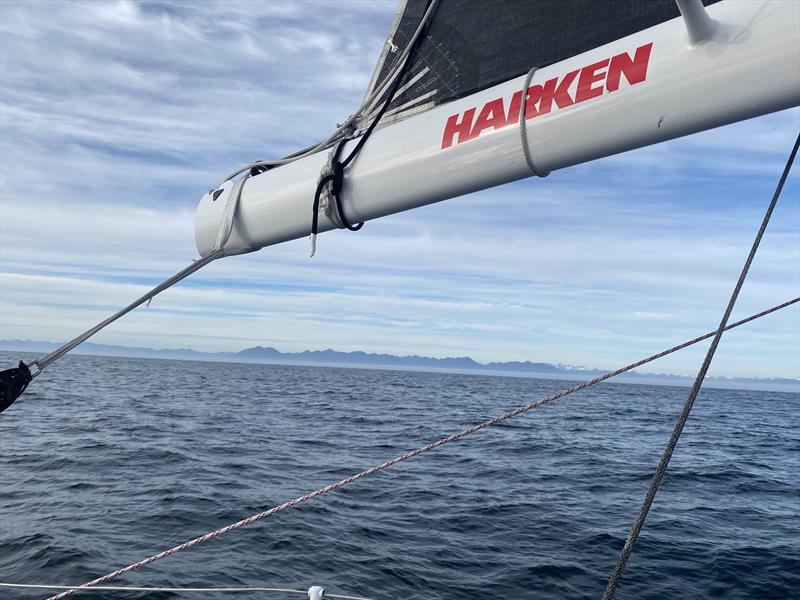
Watching sailing's magic unfurl offshore
by David Schmidt 3 Aug 2022 03:00 NZST
August 2, 2022

Mountains to port, humpbacks to starboard © David Schmidt
One of the greatest pleasures of offshore sailing is the chance to experience nature in all of her moods and forms. I recently had the fantastic opportunity to help deliver Dark Star, the boat that won the 2022 Race to Alaska (they were racing as Team Pure and Wild) home from Ketchikan, Alaska, to Seattle, Washington, by way of Vancouver Island's west coast after the racing team's walk-away victory (it was measured in entire days).
While we had champagne-like weather for almost the entire 96-hour delivery (read: no rain, following seas and downhill wind angles), one particular evening stands out.
We left Ketchikan on the penultimate Wednesday in June, sometime around noon, and by late Friday afternoon we were somewhere off of Vancouver Island's Brooks Peninsula. This stretch of water has a well-earned reputation for delivering big conditions, but we spent the afternoon sailing in 10-12 knot, rolling seas that were a couple of feet tall and coming from our quarter, and fog.
While this made for a comfortable ride, the boat - a Paul Bieker-designed Riptide 44 - is an apparent wind machine. We were carrying a full mainsail and a cruising asymmetric kite, and the angles, the air pressure, the sea state, and Dark Star's impressive speed meant that it was easy to outrun one's apparent air.
We rifled through drivers (mea culpa: I wasn't doing a very good job of keeping the kite filled without a lot of cross track error), before Erik and Paul (Bieker) settled in for prolonged helm sessions. Our VMG spiked, our cross-track error vanished, and things felt good.
I can't remember who turned on the stereo and the cockpit speakers, but soon the tunes were flowing, bars of dark chocolate were making the rounds, and there was plenty of post-dinner coffee and tea to be had. While it was getting late, evening hadn't yet spilled over to night (remember this was at 50 degrees north latitude, roughly 96 hours after the summer solstice), and the whole crew was hanging out in the cockpit, watching Erik and Paul taking turns coming darn close to matching boatspeed with windspeed.
That's when the clouds parted.
Suddenly, grand expanses of saw-tooth like peaks, still white with their coats of winter and spring snowfall, appeared off of our port board. We always knew that there were huge mountains around, but - given that we had spent the greater part of 36 hours in a fog bank - we were suddenly true believers.
A comfortable silence spilled over the cockpit, as we each took in the scene.
That's when someone noticed a whale's tail. Then, many.
While I suspect Erik, our skipper, had been focusing on finding better wind pressure with his weather routing, he had expertly guided us to the perfect place: To port lay the expanse of Vancouver Island; to starboard (and, soon, ahead and astern) were whales. I lost count, but I'm guessing that I saw at least a dozen animals, maybe more, all swimming a northerly course.
I can only imagine what the humpbacks thought of Dark Star's slippery undercarriage and appendages, but we had plenty of time to contemplate their graceful bodies, the sheer size of their pod, and the fact that these beautiful creatures make this lonely stretch of sea their home for part of the year.
While we all knew that we needed to settle into our nighttime watch schedule, everyone stayed on deck to see the last of the dorsal fins and tails vanish.
That's when the evening stars began populating the darkening sky.
While I live in Bellingham, Washington, a place that prides itself on its inky dark skies, my backyard has nothing on the heavenly scene that revealed itself.
If you're not familiar with this stretch of coastline, this is one of the West Coast's most desolate stretches, with no visible onshore lights, cities or towns, and not even other nearby vessels. Basically, zero light pollution.
Standing in the cockpit, looking aloft, felt like peering through our own private version of the James Webb Space Telescope... just with our bare eyes.
The sky was soon pure blackness, punctuated only by the light of so many distant stars, and we reluctantly slid back into our watch schedules.
May the four winds blow you safely home,
David Schmidt
Sail-World.com North American Editor